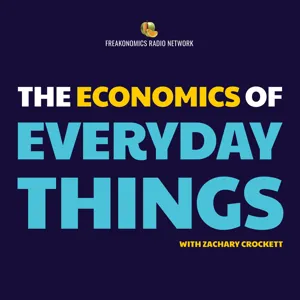Podcast Summary
From Mocking to Avid Fan: The Evolution of Romance Novels: Romance novels, once dismissed, are now a billion-dollar industry with roots dating back to the 18th century. They gained commercial success in the 1950s and evolved through the Romance Wars, with Harlequin emerging as the dominant player.
Romance novels, once dismissed as insignificant, have become a billion-dollar industry. Danielle Flores, an English major turned high school math teacher, shares her personal journey from mocking romance readers to becoming an avid fan herself. The genre's roots can be traced back to the 18th century with Samuel Richardson's "Pamela," but it wasn't until the 1950s that romance novels gained commercial success through publishers like Harlequin. The genre evolved, with the introduction of bodice rippers in the 1970s, and a fierce competition, known as the Romance Wars, ensued between major publishers. Harlequin emerged as the dominant player, eventually buying out its main competitor, Silhouette, in 1984. Today, romance novels continue to be a popular escape for millions of readers, with physical sales up over 50% in the past year alone. Despite their humble beginnings, romance novels have proven to be a powerful and enduring force in the literary world.
Romance Publishing: A High-Volume Industry with Diverse Subgenres: The romance publishing industry is vast, driven by subscriptions, and caters to diverse subgenres, with covers playing a crucial role in marketing and prolific writers essential to meet the demand.
The romance publishing industry is vast and diverse, catering to various subgenres and reader preferences. The business model is high volume and driven by subscriptions, with an insatiable demand for new books. Covers play a crucial role in marketing and signaling genre and story content. Prolific writers are essential to meet this demand, with some authors writing over 300 books in their careers. Many authors begin as avid romance readers, and the industry continues to evolve, constantly researching and responding to reader desires. From historical to paranormal, medical, teacher, brewery owner, NASCAR driver, gargoyle, and canine unit romances, there's a book for every reader's cup of tea.
Success in Romance Novels through Self-Publishing: Romance authors, historically underpaid and overlooked, have found financial success through self-publishing, earning higher royalties and reaching wider audiences.
Romance author Brenda Hyatt identified a consistent structure in popular romance novels and found success by embracing this formula and later self-publishing her backlist as ebooks. Traditional publishing offered limited financial rewards, and women writers in this genre faced disrespect and lack of recognition. However, with the rise of ebooks and self-publishing, Hyatt and others experienced significant financial growth, earning higher royalties and reaching wider audiences. Despite being a significant contributor to the publishing industry, romance authors often go unnoticed in financial statistics due to their exclusion from traditional publishing data. However, the success stories of self-published romance authors prove that there's a profitable niche in this market, with some authors even reaching seven figures in earnings.
Self-publishing opens doors for diverse romance authors: Self-publishing empowers underrepresented authors to share their stories and connect with readers, particularly in the romance genre where there's a growing demand for spicier and more diverse narratives.
Self-publishing has opened up new opportunities for authors, particularly those writing in genres like romance, to make a living and have creative control over their work. This is evident in the success story of Delaney Diamond, who has published over 50 books and taps into a trend of spicier, more diverse romance novels. However, representation and identity are also important aspects of Diamond's work. Growing up, she noticed a lack of diversity in the romance novels she read and decided to write her own stories with black heroines. Unfortunately, traditional publishing did not provide opportunities for black romance authors at the time, leading Diamond and others to self-publish. Today, there are efforts to level the playing field, with programs and initiatives aimed at recruiting and publishing authors with diverse backgrounds. Overall, the self-publishing revolution has allowed for more representation and variety in literature, giving voice to underrepresented communities and allowing authors to connect with readers on a deeper level.
Romance novels' growth and societal acceptance challenges: Romance novels, once a niche genre, have become a billion-dollar industry due to fans' open-mindedness. Despite societal stigmas, readers seek escapism and hope. E-readers and online communities make it easier for fans to connect and share their love for the genre, but broader acceptance remains a challenge.
Romance novels, once a niche genre, have grown into a billion-dollar industry due to the open-mindedness and acceptance of fans. Despite societal stigmas, readers continue to seek out these novels for escapism and hope. The accessibility of e-readers and online communities has made it easier for fans to connect and share their love for the genre. However, despite its popularity, romance novels still face challenges in gaining broader societal acceptance. Danielle Flores, a romance novel fan, shares her experiences with judgment and jokes but remains unapologetic about her love for the genre. She, like many other fans, finds comfort and happiness in the stories she reads. The convenience of e-readers also adds to the appeal, allowing readers to consume these novels discreetly in public. The Freakonomics Radio Network's Economics of Everyday Things episode on romance novels sheds light on the genre's growth and the reasons behind its enduring appeal.






